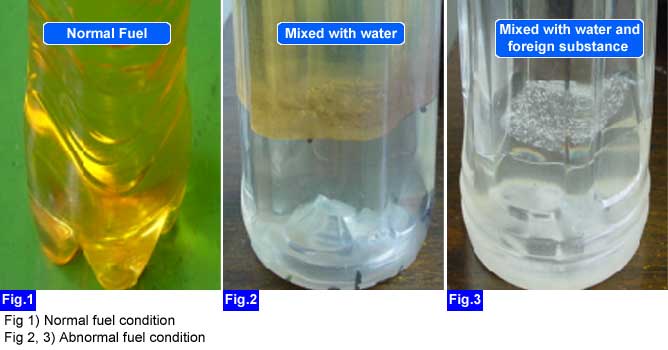Art the fuel quality, fuel tank and fuel filter normal?
 | ▶ If fuel quality is normal, Go to "Fuel pressure inspection" as below, |
 | ▶ Repair or clean the fuel tank (fuel line) as necessary. |
Inspect "Basic inspection" and "system inspection". Inspect "Basic inspection" first.
Inspect fuel leakage visually from fuel tank and fuel pump mounting point.
Inspect fuel quality and inside of fuel tank after removing fuel pump.
Check contamination of fuel filter and foreign substances in the fuel filter.
Art the fuel quality, fuel tank and fuel filter normal?
 | ▶ If fuel quality is normal, Go to "Fuel pressure inspection" as below, |
 | ▶ Repair or clean the fuel tank (fuel line) as necessary. |
Measure the fuel pressure at idle after installing a fuel pressure gauge to delivery pipe.
☞ Install a fuel pressure gauge after combustion in the fuel line by removing fuel pump relay.
■ Specification : 324 ~ 363 kPa (3.3 ~ 3.7 kgf/㎠, 46.9 ~ 52.6 psi)
Is fuel pressure within the specification?
 | ▶ Go to "fuel remain pressure inspection" procedure as below. |
 | ▶ Repair or replace fuel filter and fuel hose (whether it is blocked or not) ▶ Replace the fuel pump. |
Monitor fuel pressure at fuel pressure inspection as above.
Engine "STOP"
Check decrease in fuel pressure.
■ Specification : After engine stops, the gage reading should hold for about 5 minutes.
Does the fuel pressure remain after engine stop?
 | ▶ Fuel supply state is normal. |
 | ▶ Replace the fuel pump. (Check valve does not remain pressure.) ▶ Repair or replace fuel leakage in the fuel filter and fuel line. |
1. Toxic odor
2. Eyes stung
3. Hard vaporizing
4. Knocking suddenly after fuelling up
5. Hard starting after fuelling up (In the winter)
1. Knocking
2. Excessive fuel consumption
3. Poor power/acceleration
4. Fuel system damage such as fuel pump, Injector and component of the combustion-camber damage such as piston etc...
5. Deposit rising or corrosion (in the engine and fuel system)
6. Fuel pressure decrease or Engine stalling by vapor lock.
7. Impossible starting by low volatile
8. Discharge carcinogen
9. Discharge pollutant (CO, HC, NOx etc...)
